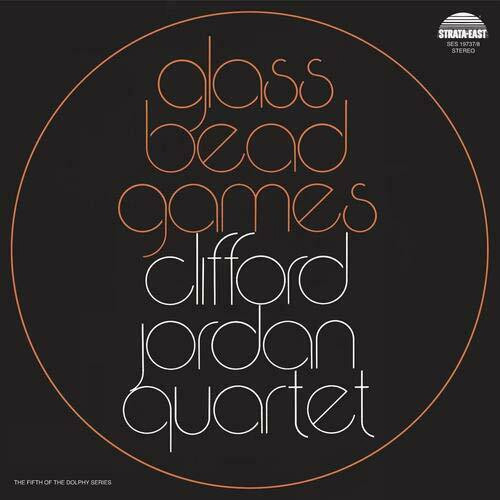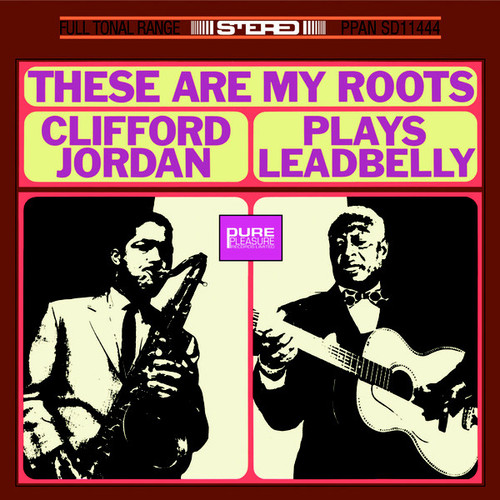180g High Quality Pressing!
Re-mastering by Ray Staff at Air Mastering!
Clifford Jordan is joined by Stanley Cowell, Cedar Walton, Bill Lee, Sam Jones & Billy Higgins for two sessions recorded October 29, 1973 at Minot Sound Studio, White Plains, NY.
"Fifth part of the Strata-East Dolphy Series, Glass Bead Games is arguably the crown jewel of the Strata East movement, an amorphous genre that treads an unusual path between post-bop, 70s avant-garde and spiritual jazz, with a groove.
"Glass Bead Games is full of revelations at many levels. First, the decade of the 1970s did produce genuinely creative, "human" new music flowing from the jazz mainstream; second, Bill Lee was more than Spike's dad: he was a superlative bassist, a team player of the first order, a powerful catalyst who, if anything, deserves to be better known than his son; third, Billy Higgins was, as so many musicians insist, a once-in-a-lifetime drummerthe bellows inspiriting the collective flame.
"Most importantly, Clifford Jordan was an artist of the first order, his playing so effortless and unforced, unselfconscious and focused, mature and wise that, at a time when altissimo fury was all the rage, it's small wonder his authentic voice frequently went unheard. His musical rhetoric is so personally expressive, its substance so compelling, the listener couldn't care less about the extraordinary technique required to convey its captivating message. Compared to some of his more acclaimed peers he's a less aggressive yet paradoxically more directive and shaping influence. The climaxes, rather than spelled out, are merely suggested, registering with deep and lasting impact on the listener. It all comes down to learning the language, those precious little beads. Not every player, including Jordan or the listener, can use it like Shakespeare, but all can learn to read Shakespeare and understand its principles of arbitrariness and serendipity, of invariance and transformation.
"Jordan, no less than Shakespeare, requires a like-minded cast of playersin this case four musicians of such redoubtable proficiency that each remains committed to keeping the beads in play. He's not a man content with a mere musical "dialogue" with his fellow musicians nor is he about to take the initiative in pulling his troops up to his level. Instead he begins to tell a musical story that's so compelling his three comrades are inspired equally to contribute to a collaborative narrative. This is brilliant music-making by a Coltrane- influenced successor who feels no obligation to mime the predecessor. It may be the most significant saxophone performance on record since Coltrane and, providing the listener stays with it for any length of time, the most deeply satisfying. Jordan's gameso effortless, unforced, and "level"erases distinctions between composed and improvised, soloist and ensemble, narrator and narrative, the dancer and the dance. It seems incapable of wearing out its welcome." - Samuel Chell, All About Jazz
"The original release was issued both as a double album and as two separate discs. It was underappreciated at the time and originals became high-priced collectors items. Until this year, it was not available on vinyl, although it has been reissued from time to time on CD, including as part of a 'complete' Clifford Jordan package from Mosaic Records. None of these predecessors, however, will prepare you for just how well recorded and reproduced this reissue sounds. Ron Carran recorded the sesions at his Minot Sound Studio in White Plains, New York. Hundreds of titles were recorded at Minot in the 1970s and 1980s, none of which have struck me before as being exceptional. This reissue proves the exception to the rule - the instruments are well recorded and balanced, and the soundstage is exceptional. If there is a better sounding title in the Strata-East catalogue I have not heard it. I wonder how many other Strata-East titles have such sonics awaiting discover?" - Hi-Fi+, Issue 171, Recording 9.5/10, Music 9/10
Features:
• 180g Vinyl
• Double LP
• Re-mastering by Ray Staff at Air Mastering, Lyndhurst Hall, London
• Gatefold jacket
• Made in the U.K.
Musicians:
Quartet 1:
Clifford Jordan, tenor saxophone
Billy Higgins, drums
Stanley Cowell, piano
Bill Lee, bass (A1, A4, B1,2, 3, C3, D1)
Quartet 2:
Clifford Jordan, tenor saxophone
Billy Higgins, drums
Cedar Walton, piano
Sam Jones, bass (A2, 3, C1,2, D2)
Selections:
Side A:
1. Powerful Paul Robeson
2. Glass Bead Games
3. Prayer To The People
4. Cal Massey
Side B:
1. John Coltrane
2. Eddie Harris
3. Biskit
Side C:
1. Shoulders
2. Bridgework
3. Maimoun
Side D:
1. Alias Buster Henry
2. One For Amos
Re-mastering by Ray Staff at Air Mastering!
Clifford Jordan is joined by Stanley Cowell, Cedar Walton, Bill Lee, Sam Jones & Billy Higgins for two sessions recorded October 29, 1973 at Minot Sound Studio, White Plains, NY.
"Fifth part of the Strata-East Dolphy Series, Glass Bead Games is arguably the crown jewel of the Strata East movement, an amorphous genre that treads an unusual path between post-bop, 70s avant-garde and spiritual jazz, with a groove.
"Glass Bead Games is full of revelations at many levels. First, the decade of the 1970s did produce genuinely creative, "human" new music flowing from the jazz mainstream; second, Bill Lee was more than Spike's dad: he was a superlative bassist, a team player of the first order, a powerful catalyst who, if anything, deserves to be better known than his son; third, Billy Higgins was, as so many musicians insist, a once-in-a-lifetime drummerthe bellows inspiriting the collective flame.
"Most importantly, Clifford Jordan was an artist of the first order, his playing so effortless and unforced, unselfconscious and focused, mature and wise that, at a time when altissimo fury was all the rage, it's small wonder his authentic voice frequently went unheard. His musical rhetoric is so personally expressive, its substance so compelling, the listener couldn't care less about the extraordinary technique required to convey its captivating message. Compared to some of his more acclaimed peers he's a less aggressive yet paradoxically more directive and shaping influence. The climaxes, rather than spelled out, are merely suggested, registering with deep and lasting impact on the listener. It all comes down to learning the language, those precious little beads. Not every player, including Jordan or the listener, can use it like Shakespeare, but all can learn to read Shakespeare and understand its principles of arbitrariness and serendipity, of invariance and transformation.
"Jordan, no less than Shakespeare, requires a like-minded cast of playersin this case four musicians of such redoubtable proficiency that each remains committed to keeping the beads in play. He's not a man content with a mere musical "dialogue" with his fellow musicians nor is he about to take the initiative in pulling his troops up to his level. Instead he begins to tell a musical story that's so compelling his three comrades are inspired equally to contribute to a collaborative narrative. This is brilliant music-making by a Coltrane- influenced successor who feels no obligation to mime the predecessor. It may be the most significant saxophone performance on record since Coltrane and, providing the listener stays with it for any length of time, the most deeply satisfying. Jordan's gameso effortless, unforced, and "level"erases distinctions between composed and improvised, soloist and ensemble, narrator and narrative, the dancer and the dance. It seems incapable of wearing out its welcome." - Samuel Chell, All About Jazz
"The original release was issued both as a double album and as two separate discs. It was underappreciated at the time and originals became high-priced collectors items. Until this year, it was not available on vinyl, although it has been reissued from time to time on CD, including as part of a 'complete' Clifford Jordan package from Mosaic Records. None of these predecessors, however, will prepare you for just how well recorded and reproduced this reissue sounds. Ron Carran recorded the sesions at his Minot Sound Studio in White Plains, New York. Hundreds of titles were recorded at Minot in the 1970s and 1980s, none of which have struck me before as being exceptional. This reissue proves the exception to the rule - the instruments are well recorded and balanced, and the soundstage is exceptional. If there is a better sounding title in the Strata-East catalogue I have not heard it. I wonder how many other Strata-East titles have such sonics awaiting discover?" - Hi-Fi+, Issue 171, Recording 9.5/10, Music 9/10
Features:
• 180g Vinyl
• Double LP
• Re-mastering by Ray Staff at Air Mastering, Lyndhurst Hall, London
• Gatefold jacket
• Made in the U.K.
Musicians:
Quartet 1:
Clifford Jordan, tenor saxophone
Billy Higgins, drums
Stanley Cowell, piano
Bill Lee, bass (A1, A4, B1,2, 3, C3, D1)
Quartet 2:
Clifford Jordan, tenor saxophone
Billy Higgins, drums
Cedar Walton, piano
Sam Jones, bass (A2, 3, C1,2, D2)
Selections:
Side A:
1. Powerful Paul Robeson
2. Glass Bead Games
3. Prayer To The People
4. Cal Massey
Side B:
1. John Coltrane
2. Eddie Harris
3. Biskit
Side C:
1. Shoulders
2. Bridgework
3. Maimoun
Side D:
1. Alias Buster Henry
2. One For Amos









